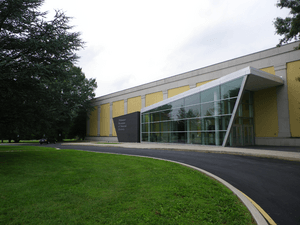- This page was last modified on 17 October 2025, at 10:18. Suggest an edit.
Delaware Museum of Nature & Science facts for kids
 |
|

The museum in 2010
|
|
| Lua error in Module:Location_map at line 420: attempt to index field 'wikibase' (a nil value). | |
| Established | 1957 (open to public May 13, 1972) |
|---|---|
| Location | 4840 Kennett Pike, Wilmington, Delaware, 19807 USA 302.658.9111 |
| Type | Natural history |
| Visitors | Over 65,000 |
| Public transit access | |
The Delaware Museum of Nature & Science (DMNH) is an exciting place to explore nature. It is located in Wilmington, Delaware. This museum is famous for its huge collections of seashells, birds, and bird eggs. In fact, its bird egg collection is the second largest in North America! It is also the oldest natural history museum in Delaware. The museum first opened its doors in 1972. After being closed for two years for big renovations, it reopened on January 1, 2022.
Contents
Discovering the Museum's Past
The idea for the museum started with a naturalist and philanthropist named John E. du Pont. He was known as "Golden Eagle." From a young age, he loved collecting seashells, birds, and bird eggs. He even earned a doctorate in natural science in 1965. John du Pont also wrote several books about birds.
How the Museum Began
John du Pont was very interested in creating a natural history museum. He went on many scientific trips to places like the South Pacific and the Philippines. During these trips, he discovered about two dozen new types of birds.
His uncle, Henry Francis du Pont, helped him by providing land for the museum. This land was near the Winterthur estate in Delaware's Brandywine Valley. The museum first opened in 1972. It was called the Delaware Museum of Natural History back then. Many members of the du Pont family and other museum experts attended the opening. It was the first major natural history museum to open since 1910.
Amazing Collections at the Museum
The museum's first collections were based on John du Pont's own items. These included about 1,000,000 seashells and 100,000 bird eggs. Scientists used these collections to study wild animals. Today, the DMNH is one of the top fifteen museums in the United States for its collections of mollusks (like snails and clams) and birds. It still has the second largest collection of bird eggs in North America.
The Delaware Diamond Star
In 1999, the museum held a fun contest. They wanted to name a star called TYC 3429-697-1. A 12-year-old girl from Wilmington, Amy Nerlinger, won the contest. Her winning name was "The Delaware Diamond." The Delaware General Assembly later recognized this name. In 2000, the star became an official state symbol. However, it's important to know that this naming was done through a private company. So, it is not officially recognized by astronomers.
Modernizing the Museum
The museum had a big expansion in 2005. This added more space for learning and new exhibits. These new exhibits included displays about dinosaurs, mammals, and the famous scientist Charles Darwin.
In 2020, the museum announced it would close for renovations. It reopened in 2022 with its new name, the Delaware Museum of Nature and Science. The updated museum now focuses more on the nature and geology of Delaware.
External links
- Brandywine Museums & Gardens Alliance
